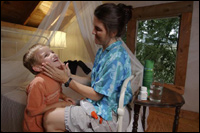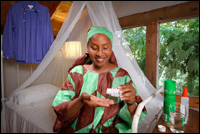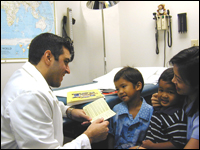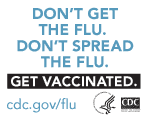Don't Let Mosquito Bites Spoil Your Tropical Travel This Winter
 Travelers to tropical areas may be at risk for malaria, dengue fever or other infections spread by mosquito bites. You can take steps to prevent these diseases.
Travelers to tropical areas may be at risk for malaria, dengue fever or other infections spread by mosquito bites. You can take steps to prevent these diseases.
Now is the time when many families are planning their winter vacations. If you are thinking about an exotic tropical destination, you have probably already spent time mapping out the best beaches and gathering guides and phrase books. Or maybe you have decided to visit family and old friends. Whatever your reason for travel, don't forget – many tropical destinations have mosquitoes that can spread diseases like malaria and dengue fever. Don't let mosquito bites spoil your trip!
The good news is that you can take steps to prevent malaria, dengue, and other diseases spread by mosquitoes which can circulate year round in the tropics.
- Listen to a CDC podcast:
- Malaria and Tropical Travel (
 7:58 mins)
7:58 mins) - Don't Let the Bugs Bite: Preventing Dengue and Other Diseases Spread by Mosquitoes (2007) (
 4:40 mins)
4:40 mins)
This is a previously-run podcast that has helpful information about preventing dengue fever, which is spread by mosquitoes. In 2007 and 2008, there have been numerous reports to the CDC about dengue cases.
- Malaria and Tropical Travel (
- Find out if you will be going to a malaria or dengue risk area. Select your travel destination from the Travelers' Health Web site and read about the health risks in that area. Then, use this guide to learn about how to protect yourself from malaria, dengue fever, and other diseases spread by mosquitoes.
Prevent Mosquito Bites

Parents should apply insect repellent on their children as well as on themselves.
- Apply insect repellent to prevent mosquito and other insect bites.
- For adults, insect repellent should contain 30%-50% DEET or Picaridin, which is available in 7% and 15% concentrations but needs more frequent application.
- For additional information regarding the use of repellent on infants and children, please see the "Insect and Other Arthropod Protection" section in Traveling Safely with Infants and Children and the "Children" section of CDC's Frequently Asked Questions about Repellent Use.
- To prevent mosquito bites, apply insect repellent if out of doors. Mosquitoes that transmit malaria are most active between dusk and dawn. Daytime biters include mosquitoes that transmit dengue virus.
- When using sunscreen, apply it before insect repellent.
- Wear lightweight long pants, long-sleeved clothing, and a hat outdoors.
- Consider applying permethrin (often found in stores with the camping equipment) to the clothing that you will wear during your trip as an additional layer of mosquito bite prevention.
- Sleep under an insecticide-treated bed net, especially if you are not staying in screened or air-conditioned housing.
- For detailed information about insect repellent use, see Mosquito and Tick Protection .
Take Medicine to Prevent Malaria

Be sure to take antimalarial drugs exactly on schedule without missing doses.
If you are going to an area where there is a malaria risk, you can take certain medicines to help protect you from malaria during your trip. (Remember, it is still important to prevent mosquito bites, even if you are taking medicine!) Which medicine you take will depend on your own health history and the place you are traveling. All of these medicines must be taken for a certain amount of time before travel, during travel, and after departing from the malaria risk area.
When you visit your healthcare provider, be sure to ask for a prescription for a medicine to prevent malaria. Ask your doctor or pharmacist for clear directions on how to take the medicine properly and be sure to take your medicine on schedule without missing doses.
Visiting Family and Friends
Going "home" to visit friends and relatives? Even if you were born a country where malaria is present, you may still get malaria if you return as a visitor because most likely you are no longer immune. Your children are also susceptible as they did not grow up with malaria exposure. Find out how you can protect yourself and your family.
Read more information about malaria and travel and about risks related to dengue fever.
It's Not Just the Mosquitoes!

See a healthcare provider before you travel, and if you become sick during your trip or after you return home.
Mosquitoes are only one of the concerns to take into account when preparing for travel. You can learn more about the recommended vaccinations and prevention tips for your travel on the Travelers' Health Web site. Visit your healthcare provider 4–6 weeks before travel for any necessary vaccinations and prevention advice. Stay healthy and enjoy your visit!
After You Return Home
If you feel sick during or after your trip, especially with a fever, you should see a healthcare provider. If you are back home, make sure to tell the healthcare provider that you have recently traveled.
Malaria is always a serious disease and may be a deadly illness. If you become ill with a fever or flu-like illness either while traveling in a malaria-risk area or after you return home (for up to 1 year), you should seek immediate medical attention and should tell the physician your travel history.


